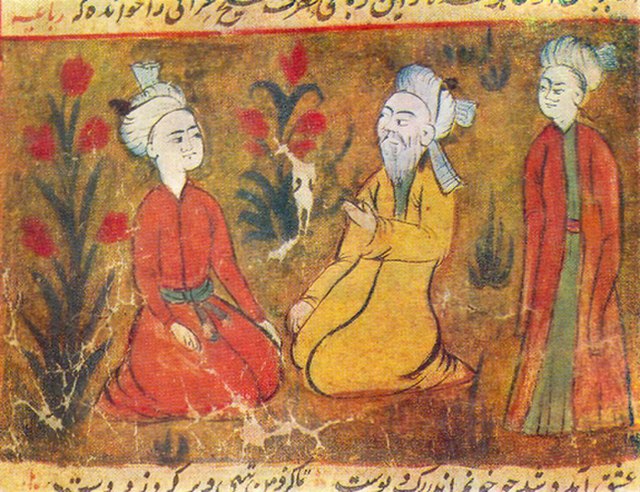Urdu poetry is a tradition of poetry and has many different forms. Today, it is an important part of the culture of India and Pakistan. According to Naseer Turabi there are five major poets of Urdu: Mir Taqi Mir (d.1810), Mirza Ghalib, Mir Anees (d.1874), Muhammad Iqbal and Josh Malihabadi (d.1982). The language of Urdu reached its pinnacle under the British Raj, and it received official status. All famous writers of Urdu language including Ghalib and Iqbal were given British scholarships. Following the Partition of India in 1947, it found major poets and scholars were divided along the nationalistic lines. However, Urdu poetry is cherished in both the nations. Both the Muslims and Hindus from across the border continue the tradition.
Amir Khusrau, a 13th-century Urdu poet.
Mir Muhammad Taqi, known as Mir Taqi Mir, was an Urdu poet of the 18th century Mughal India and one of the pioneers who gave shape to the Urdu language itself. His father's name was Meer Muttaqi. After his father's death, his step-Brothers took control over his property. His step-uncle took care of him after he was orphaned and after the death of his step-uncle(paternal) his maternal step-uncle took care of him. The signature of his poetry is the grief he expresses. He has expressed a lot of grief over the downfall of his city, Delhi. He was one of the principal poets of the Delhi School of the Urdu ghazal and is often remembered as one of the best poets of the Urdu language. His pen name (takhallus) was Mir. He spent the latter part of his life in the court of Asaf-ud-Daulah in Lucknow.
Mir Taqi Mir in 1786.[citation needed]
Mir Taqi Mir
Mir Taqi Mir, Lucknow, 1800-10


![Mir Taqi Mir in 1786.[citation needed]](https://upload.wikimedia.org/wikipedia/commons/thumb/5/5c/Mir_Taqi_Mir_1786.jpg/428px-Mir_Taqi_Mir_1786.jpg)

